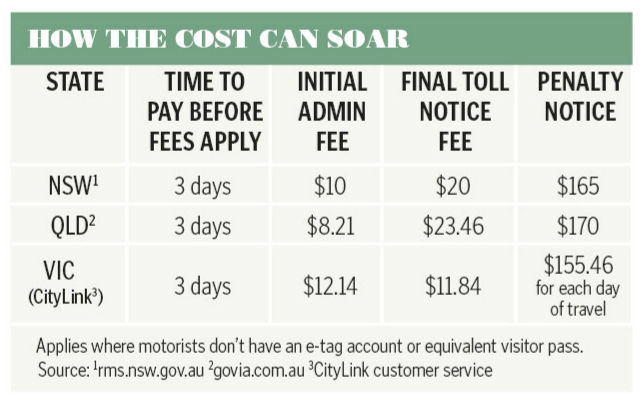Toll rort costs Aussies $160 million a year
By Nicola Field
An unpaid toll can potentially leave motorists hundreds of dollars out of pocket, and even facing imprisonment
The current wave of infrastructure development taking place across many Australian cities is seeing the number of toll roads expand rapidly.
It means improved travel for motorists, though this convenience can come at a remarkably high price. Leave a toll unpaid and you can face a raft of fees and charges far beyond the value of the outstanding toll.
As a guide to the possible financial fallout of unpaid tolls, in early 2016 The Age reported the case of a woman who amassed $50,000 worth of unpaid tolls and associated charges.
It came about through a combination of personal factors including the birth of a new baby, a cancer diagnosis, a change of address and the woman's partner driving for eight months across Melbourne's tollways without an e-tag.
The situation reached crisis point when a sheriff appeared at her home with a warrant for her arrest.
This may be an extreme example but in one case referred to the Tolling Customer Ombudsman (TCO) a driver received 17 invoices for unpaid tolls over a five-day period - each invoice attracting its own $21.32 administration fee. It meant he owed almost $400, of which tolls comprised just $30.
To understand how drivers can find themselves in this nightmare scenario, it's worth looking at how the toll system works.
Australia has 16 toll roads in three states - Victoria, Queensland and NSW. The vast majority of these, 13 in all, are owned or part-owned by the publicly listed company Transurban.
For the toll giant, user-pay roads are a solid earner. In the 2015-16 financial year alone Transurban's toll revenue rose 17.5% to $1.9 billion.
For motorists planning to use toll roads, preparation pays off. Our system of cashless toll roads makes an electronic tag (e-tag) or pass a must-have to be sure tolls are paid on time.
These need to be set up before travel, otherwise a three-day grace period applies in which drivers can pay the toll online without incurring additional charges. The problem is that it's very easy to overlook this step. The big memory jogger can be a letter arriving in the mail demanding payment.
It can take up to a month after the date of travel for toll notices to arrive, and when it does the unpaid toll is stacked with an administration fee. Like tolls themselves, this fee varies between states. The common thread is that unless you already have an account with the toll road provider, the flat administration fee can be considerably higher than the toll itself.
As a guide, Sydney's Westlink (M7) motorway charges distance-based tolls so the cost of using the road varies according to the entry and exit points taken.
An unpaid toll of as little as $2.07 will generate an administration fee of $10 - a charge almost 500% higher than the unpaid toll.
It's likely the same motorist will make a similar return journey, and because separate invoices are issued for each unpaid toll, the driver could face charges of $20 on unpaid tolls of just $4.14.
If the first toll notice goes unpaid, which can happen if the driver changes address without updating their car's registration details, the fees go up a gear.
In Queensland, for instance, where Transurban trades as Go Via, motorists using, say, the Logan Motorway (M2) have three days to make good an unpaid toll otherwise an administration charge of $8.21 applies. If the toll remains outstanding a separate demand notice is issued for every unpaid toll - each attracting a fee of $23.46.

If payment isn't made at this point, the driver can be slugged with a $170 infringement notice for each demand notice. From here, the matter may be referred to the State Penalties Enforcement Registry, which can charge a further layer of fees.
To be fair to toll road operators, motorists are given plenty of opportunities to pay the toll before the outstanding debt is escalated to the next stage. But it's easy to argue that the fees and fines seem wildly out of kilter with the toll.
The situation is more serious in Victoria, where failure to pay for use of a toll road is a criminal offence that can lead to imprisonment.
In NSW, toll debt is enforced mainly through the civil system though motorists can be asked to perform community service for an unpaid toll - a breach of which can result in time behind bars.
Michael Arnold, the Tolling Customer Ombudsman, has noted that the issue of administration fees charged by toll operators is "constantly brought up by toll road users" especially when the toll collection process is escalated.
Arnold has also stated: "Irrespective of the way administration fees are fixed, they must not impose a penalty on the customer but must reflect the actual costs to the toll operator for the administrative work involved."
The website for Roam, which is owned by Transurban, states that administration fees reflect the actual costs associated with "reviewing the violation image, processing the licence plate number, printing and posting the toll notice and processing payments". According to Transurban, fees are audited regularly to ensure they comply with this requirement.
Nonetheless, for motorists who face financial hardship, or who have relocated and simply not received the initial invoice, the mounting cost can be overwhelming.
Transurban's 2016 financial reports lump toll and fee revenue together as one revenue stream totalling $1.946 billion. But previous reports reveal that fees and other revenue outside conventional toll costs represented $167 million in 2015, a figure that augmented $1.559 billion in toll income.
Australian motorists paid $115 million in administrative fees and other to Transurban in 2014, a year that saw the company earn a further $1.117 billion in regular toll revenue, suggesting around 10 per cent of Transurban's toll-related income stems from late fees and administrative charges.
It seems ironic that in September 2016 the federal government gave the Australian Competition & Consumer Commission (ACCC) the power to rein in companies that slap customers with excessive surcharges for paying with a credit card. Yet over-the-top administration fees can still apply to unpaid tolls costing less than a cup of coffee.
In 2016 the Victorian Greens called for an inquiry into toll debts but little seems to be happening on this score. With more toll roads being constructed across state capitals, it's likely a growing number of motorists will discover how harsh the penalties can be when a small toll goes unpaid.

What to do if you can't pay a toll
Contact the toll road manager and explain why you cannot pay at present. You may be able to have the due date extended or be offered a payment plan. But if you're making a complaint about a toll or charge, the Tolling Customer Ombudsman offers the following tips:
- Make the complaint as soon as you possibly can.
- Be specific about what occurred - include the date, time and location.
- Be accurate in your description of the event.
- State what you want as an outcome, and be reasonable.
- Keep a record of your conversations and correspondence.
- If you are not happy, persist. Ask to speak to a manager or visit tollingombudsman.com.au.
Have you been charged excessive fees or fines over tolls? Let us know in the comments.
Get stories like this in our newsletters.



